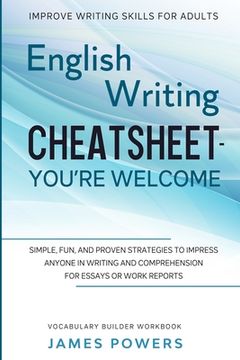Share
Improve Writing Skills for Adults: ENGLISH WRITING CHEATSHEET, YOU'RE WELCOME - Simple, Fun, and Proven Strategies To Impress Anyone In Writing and Co (in English)
James Powers
(Author)
·
Readers First Publishing Ltd
· Paperback
Improve Writing Skills for Adults: ENGLISH WRITING CHEATSHEET, YOU'RE WELCOME - Simple, Fun, and Proven Strategies To Impress Anyone In Writing and Co (in English) - Powers, James
$ 13.99
$ 19.99
You save: $ 6.00
Choose the list to add your product or create one New List
✓ Product added successfully to the Wishlist.
Go to My WishlistsIt will be shipped from our warehouse between
Monday, May 13 and
Tuesday, May 14.
You will receive it anywhere in United States between 1 and 3 business days after shipment.
Synopsis "Improve Writing Skills for Adults: ENGLISH WRITING CHEATSHEET, YOU'RE WELCOME - Simple, Fun, and Proven Strategies To Impress Anyone In Writing and Co (in English)"
The English language, whether written or spoken, is created upon grammar. Grammar is the set of rules that will control the pattern that is spoken so that everyone understands what is being said. Grammar is what tells us that we say "I went to school" instead of "I school to went" or "School went to I" when you are trying to get something across. Primarily in English, you can expect to see four types of sentences that we will go over now. Before we get into the sentence structures themselves, let's talk a bit about English. English syntax, the order that words are given, tells us the order to put our words. In English, syntax usually tells us that we need to speak in subject-verb-object form. This isn't as complicated as it sounds. Let's break down those three words briefly. Subject refers to the person that does the action. It is the doer-it is the noun that the sentence is based on. For example, if you see the sentence, "I went to school," the word "I" is the subject. I am the one that is doing the thing. Verb refers to the action, as we have gone over. It is the thing that is done. Object is the thing that I acted upon. It is the receiver of the verb. Not all sentences will have this. For example, "I play" doesn't have an object, but the sentence "I play ball" does. In that instance, "ball" is the object. Of course, other modifiers can go into the sentence, such as the adjectives, adverbs, and prepositions, but for the most part, all sentences will typically have the subject, verb, and object.

